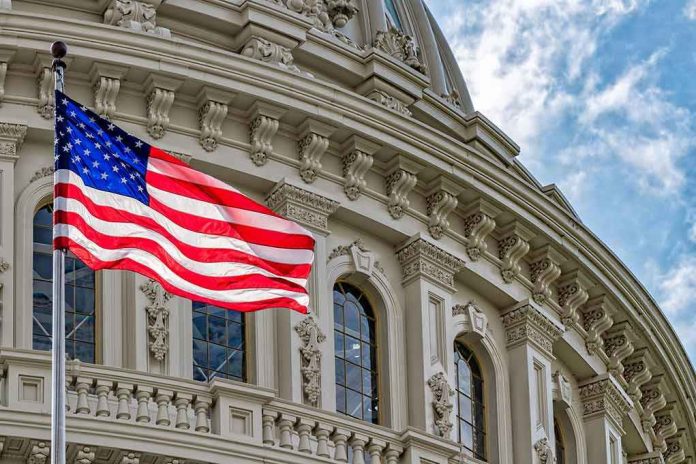
As Democrats seize on recent election gains to prolong the government shutdown, millions of Americans face lost benefits and economic risk while constitutional priorities hang in the balance.
Story Snapshot
- Senate Majority Leader Thune warns Democrats against exploiting election victories to keep the federal shutdown going.
- Essential benefits like SNAP are at risk for millions as partisan gridlock drags on.
- Economic toll mounts, with billions lost and public frustration reaching new heights.
- Negotiations intensify, but Democrats continue to demand healthcare deals as a condition for reopening government.
Thune Confronts Democrats Over Shutdown Tactics
Senate Majority Leader John Thune has issued a stark warning to Democrats, urging them not to leverage their recent electoral victories as justification for extending the federal government shutdown. Thune’s criticism on the Senate floor highlighted repeated Democratic votes against funding bills, framing the impasse as a deliberate political maneuver. He emphasized the immediate threat to services Americans depend on, like SNAP, and called for Democrats to put aside short-term political gain for the sake of the nation’s stability and well-being.
Thune’s approach resonates with conservatives who have grown frustrated watching essential government functions held hostage by partisan demands. Amid rising inflation and previous leftist policies that prioritized globalist interests over American families, these shutdown tactics represent yet another example of political elites ignoring the real-world consequences faced by working citizens. Thune’s demand for bipartisan cooperation strikes a chord with those who value limited government and constitutional responsibility, especially as critical deadlines for public benefits approach.
Shutdown Impact: Vital Benefits and Economic Fallout
The ongoing shutdown puts millions of Americans at risk of losing access to vital services, including food assistance through SNAP and other safety-net programs. As the impasse enters its second month, the economic fallout is becoming severe, with estimates pointing to as much as $14 billion in lost productivity and consumer spending. Federal employees face furloughs and delayed paychecks, while disruptions ripple through essential sectors like air travel and public safety. These consequences underscore the high cost of political brinksmanship, especially when leftist agendas take priority over fiscal responsibility.
The pain is not confined to government workers. Retailers and communities that rely on SNAP spending brace for hardship, while families already struggling with the effects of past inflation and economic mismanagement are left wondering who truly represents their interests in Washington. Many conservatives view this episode as part of a broader pattern—Democrats using every crisis to push for expansive government and undermine core American values, rather than focusing on real solutions that put citizens first.
Democrats’ Leverage Play: Election Wins and Policy Demands
Democratic leaders, emboldened by recent electoral gains, have insisted on tying the end of the shutdown to major healthcare policy changes—effectively holding the government hostage unless their demands are met. Senate Minority Leader Chuck Schumer continues to push for negotiations that prioritize progressive policy goals, even as deadlines for critical benefits loom. Some centrist Democrats have shown openness to stand-alone funding bills, but party leadership remains entrenched in a strategy of maximum leverage, seeking to extract concessions while the pressure is highest.
This hardline approach has deepened partisan divides and left many Americans—especially constitutional conservatives—concerned about the precedent being set. When one party can use a shutdown to force through unrelated policy changes, it erodes the foundations of limited government and threatens the separation of powers that guard against overreach. These are not abstract concerns; they affect the daily lives of citizens who depend on a government that works for them, not for political operatives in Washington.
Long-Term Risks: Erosion of Trust and Values
Beyond the immediate economic and social costs, the shutdown threatens to erode public trust in government and set dangerous precedents for future crises. Political scientists warn that using electoral momentum to justify prolonged gridlock could embolden both parties to employ shutdowns as routine bargaining chips, further destabilizing federal operations. For conservatives, the bigger concern is the ongoing assault on values like individual liberty, fiscal restraint, and respect for constitutional limits—values undermined when partisan interests trump the national good.
…and just like that, Democrats admitted the shutdown is all about their temper tantrums. https://t.co/zVV3YcrXw1
— Generalissimo Illegal Neanderthal 🇺🇲✝️ (@rayrothfe) November 6, 2025
As negotiations continue with no final agreement in sight, Americans watching from home—especially those who cherish traditional principles—are left questioning the priorities of leaders who gamble with their livelihoods. For many, Thune’s warnings echo a broader call to restore common sense and accountability in Washington, and to resist efforts that use crises as cover for expanding government power at the expense of the Constitution and the American way of life.
Sources:
Angry John Thune: Democrats Using Shutdown as Political Tool (Politico)
Thune: Extended Shutdown Means Senate Must Shift Date for Funding (ABC News)
Senators Closing in on Key Piece of Shutdown Deal (Politico)
Government Shutdown Latest: Trump, Senate Republicans Face Longest Impasse in History (CBS News)





